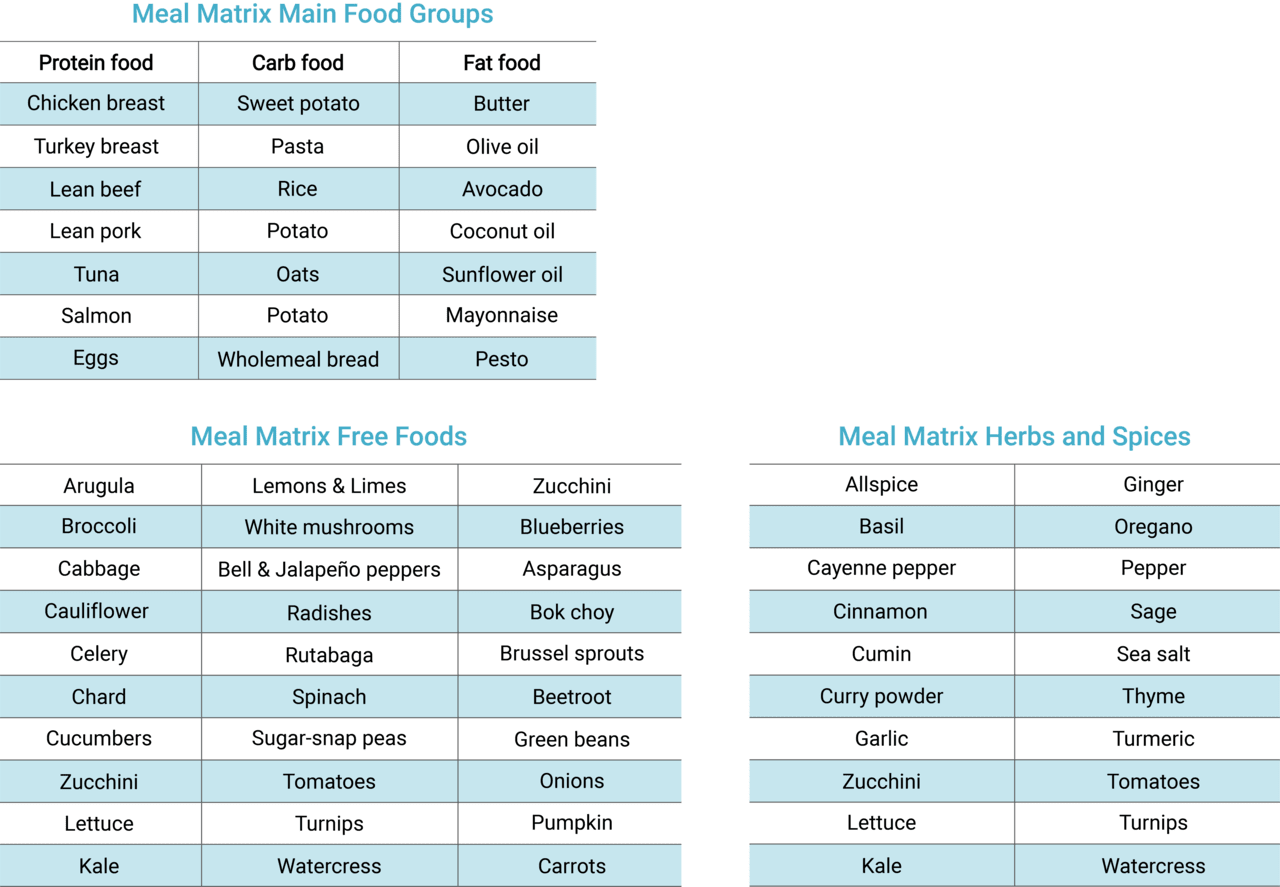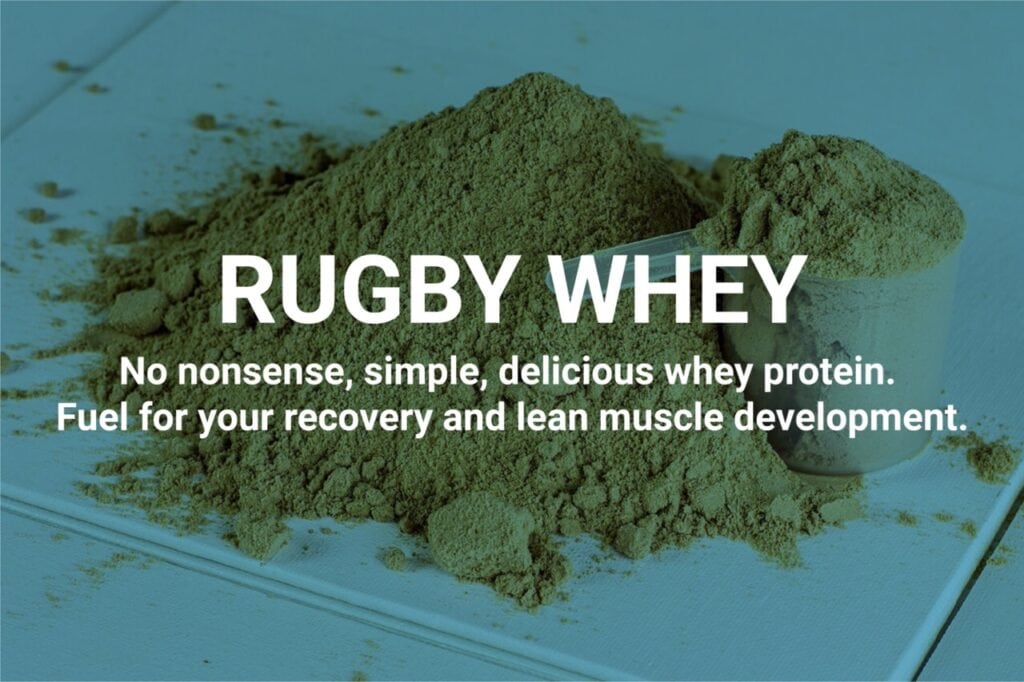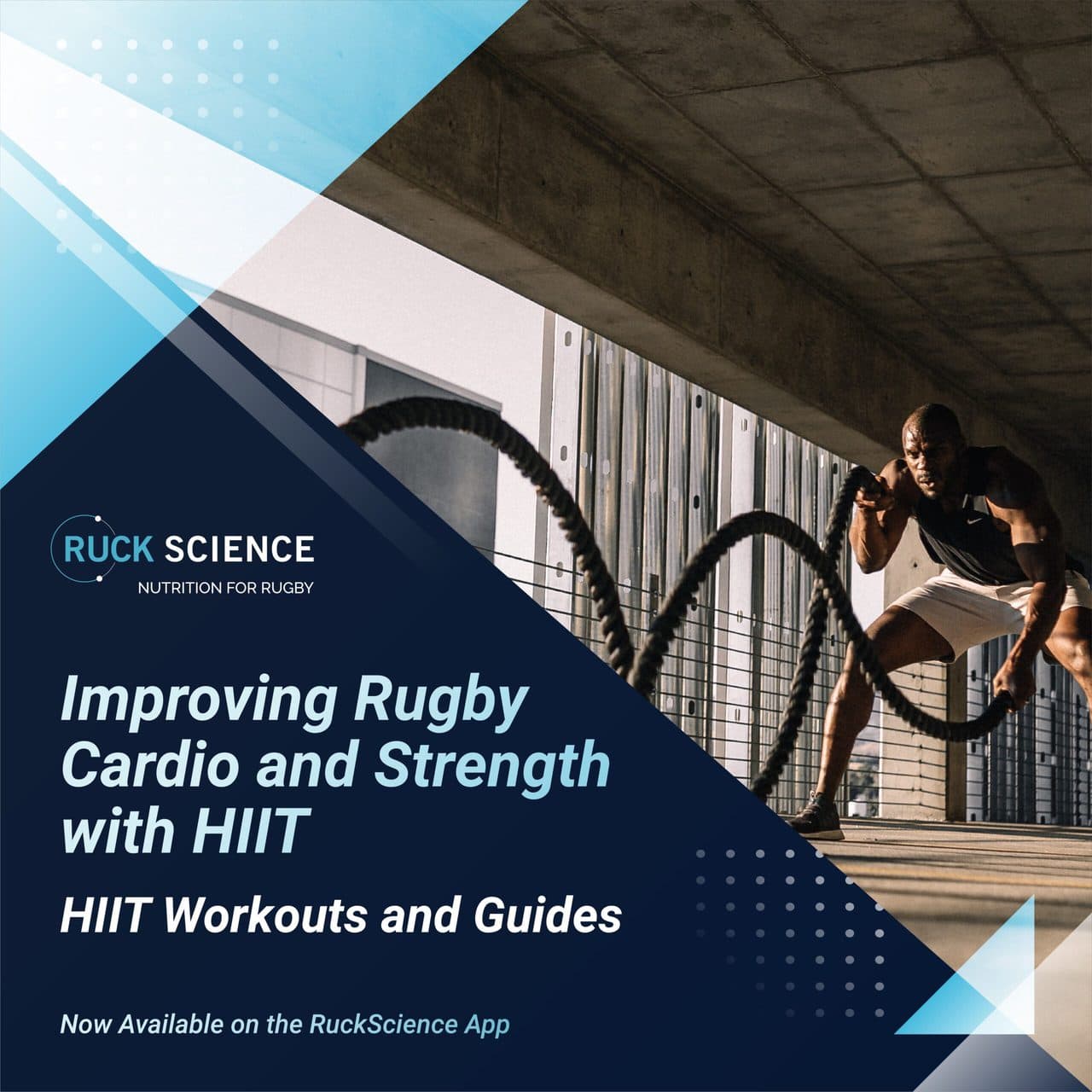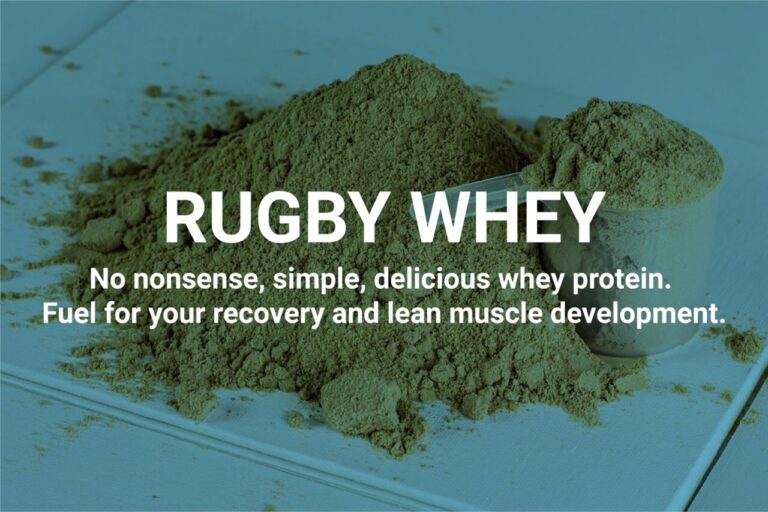
Every morsel of food you consume either becomes part of your body or affects how it functions, so if you want to perform at your best on the rugby field, you need to pay attention to what you eat.
Nutritional advice is easy to come by, and that’s where the trouble starts.
So much of it is REALLY complicated, sometimes contradictory, and often impractical to put into action. After all, how much time do you really want to spend shopping for, preparing, and cooking your food?
Most ruggers would rather be playing rugby, training, or otherwise enjoying their valuable leisure time and not slaving away in the kitchen to make their next healthy meal.
The good news is that eating for health and better rugby performance doesn’t have to be time-consuming or complicated. In fact, you can often knock out tasty, nutritious meals in 30 minutes or less.
In this article, we reveal a straightforward approach to creating simple yet tasty healthy meals and provide you with a few easy recipes to try.
The Meal Matrix – Healthy Eating
Made Simple
Whether we’re talking about the steps needed to complete a DIY job, fitness training, or eating healthily, the simpler a system is, the more likely you are to use it. More complex systems sometimes produce superior results, but if they’re too time-consuming to be practical, it won’t be long before you stop using them.
For example, a diet may well be nutritionally perfect, but if it takes you an hour to make your breakfast, it won’t be long before you give it up and go back to eating Pop-Tarts.
So, for any nutritional approach to be sustainable, it needs to be practical, and that’s where the Meal Matrix comes in.
A balanced meal requires several components to provide you with the energy and nutrients you need for optimal performance and health:
Protein – your body uses protein for muscle repair and growth. Good sources of protein include fish, chicken, and eggs. Most ruggers need to consume around 1.8-2.0 grams of protein per kilogram of body weight, or about one gram per pound.
Carbohydrate – carbs provide your body with energy in the form of glucose. You also store glucose in your muscles and liver in the form of glycogen. Glucose is your body’s preferred fuel source during high-intensity exercise, such as playing rugby and training in the gym. Carbs are also your most abundant dietary source of fiber, vitamins, and minerals. Rugby players should consume between 5-7 grams of carbs per kilogram of body weight or 2.5-3.5 grams per pound.
Fats – fats are a source of fuel during low-intensity exercise, such as steady-paced running, and play a critical role in synthesizing hormones, including testosterone. They are also crucial for absorbing and utilizing the fat-soluble vitamins A, D, and K. Most ruggers should consume about 0.7-1.0 grams of fat per kilo of body weight or roughly 0.35-0.5 grams per pound. This should be split evenly between saturated, monounsaturated, and polyunsaturated fats.
So, to create a balanced diet, you need to include all three of these food groups in most of the meals you eat.
How?
One way is to use the Meal Matrix.
Simply choose one food from each of the columns in the chart below to build the basic framework of your meal, adjusting portion sizes according to your needs.
Next, add unlimited amounts from the “free foods” list to increase your intake of vitamins and minerals.
Finally, season your meal with ingredients from the third chart to make something tasty and enjoyable to eat.
With this simple system, you can create hundreds of tasty, nutritionally balanced meals quickly and easily.

Of course, these charts are far from exhaustive, and there are plenty of other foods you could include. However, they provide enough examples to get you started, and you’re free to add more, providing they are a close match for the foods already listed.
Quick and Easy Meals for Ruggers
Many people view cooking healthy meals as something a dark art, believing it has to take hours or requires lots of culinary skill. The truth is that anyone can make healthy food, often in 30 minutes or less.
Here are a few simple recipes to get you started. Follow them as they’re written, or use them as inspiration for creating your own quick and easy meals using the Meal Matrix method described above.
1. Mocha Breakfast Smoothie
A good breakfast sets you up for the day, but most cereals are nothing but junk food, and it’s not always practical to make anything more substantial first thing in the morning. Smoothies are the ideal solution as they’re ready in minutes, and you can drink them on the go. This recipe even contains coffee for an extra, fast-acting energy boost.
Serves: 1
Prep time: 5 minutes
Cooking time: N/A
Nutrition info per serving:
- Energy – 390 calories
- Protein – 47 grams
- Carbs – 24 grams
- Fat – 24 grams
Ingredients:
½ cup fat-free milk (dairy or non-dairy as required)
1 level tablespoon instant coffee granules
10 unsalted almonds or 1 tablespoon natural almond butter
½ teaspoon stevia or another sugar alternative
½ cup crushed ice
2 scoops of chocolate whey or plant-based protein powder
Method:
- Put everything except the ice and the protein powder into a blender. Blitz on high for 30 seconds or until smooth.
- With the blender on medium, gradually add the ice and the protein powder until fully incorporated. Serve immediately or put in a thermos for later.
2. Poached Eggs and Salmon with Hollandaise Yogurt Sauce on English Muffins
This breakfast is a little more involved but still very easy to make. It’s the ideal lazy weekend breakfast or for those days when you aren’t in a rush to leave the house. It also makes a great light lunch or late supper.
Serves: 2
Prep time: 10 minutes
Cooking time: 5 minutes
Nutrition info per serving:
- Energy – 485 calories
- Protein – 33 grams
- Carbs – 33 grams
- Fat – 21 grams
Ingredients:
2 English muffins
4 slices smoked salmon or smoked trout
2 small handfuls of watercress
2 tablespoons white wine vinegar
4 large eggs
4 tablespoons natural Greek yogurt
Juice of one lemon
1 teaspoon Dijon mustard
½ teaspoon hot sauce, e.g., Tabasco
Method:
- In a bowl, whisk the last four ingredients together to make your hollandaise yogurt sauce. Set aside for use in a moment.
- Preheat your grill. Split the muffins and toast both sides lightly.
- Remove from under the heat, and top with the smoked salmon and watercress.
- Half-fill a saucepan with water and bring to the boil. Turn down to a simmer and add the vinegar. Carefully crack the eggs into the water. Poach for about three minutes.
- Gently remove each egg and place on a toasted muffin half using a slotted spoon.
- Spoon the hollandaise sauce evenly over each muffin and then pop under the grill to rewarm for 30-60 seconds. Serve immediately.
3. Peanut Butter, Banana, And Chia Seed Overnight Pudding
Always running short of time in the morning? This simple breakfast recipe is best prepared the night before, so you can grab it and go as you leave the house the next day. It’s light, creamy, and delicious and also makes a great daytime snack.
Serves: 2
Prep time: 10 minutes
Cooking time: N/A
Nutrition info per serving:
- Energy – 305 calories
- Protein – 31.5 grams
- Carbs – 26 grams
- Fat – 11 grams
Ingredients:
40 grams chia seeds
240ml almond milk
1 scoop vanilla protein powder
1 tablespoon natural peanut butter
1 medium, ripe banana
1 teaspoon honey
½ teaspoon cinnamon (optional)
Method:
- Put the chia seeds in a medium-sized bowl and cover them with the almond milk. Stir well and then pour into two pots or jars. Place in the fridge for at least three hours or preferably overnight.
- When you are ready to eat, slice the banana and add to the pots, top with the peanut butter, and then the honey. Sprinkle with cinnamon to taste and serve.
4. Rainbow Salad with Spicy Rice and Turkey
This is a salad that even people who don’t like salad will love! It’s easy to make and loaded with several different protein sources plus a lot of healthful antioxidants. Beetroot is also thought to be a performance enhancer as it helps with vasodilation and clearance of lactic acid. This is an excellent post-training meal!
Serves: 2
Prep time: 5 minutes
Cooking time: 25 minutes
Nutrition info per serving:
- Energy – 720 calories
- Protein – 57 grams
- Carbs – 90 grams
- Fat – 14.5 grams
Ingredients:
180 grams brown rice
1 red chili, finely sliced
1 garlic clove, peeled and crushed
50 grams tinned kidney beans, drained
100 grams edamame beans
2 x 175-gram turkey filets
1 tablespoon olive oil
6-8 small cooked beetroot, quartered
2 carrots, peeled and grated
½ small bunch of mint, roughly chopped
Method:
- Preheat your grill to high.
- Put the rice in a saucepan, cover with water, and boil for 10-15 minutes, or until the rice is tender. Drain the rice using a sieve and then rinse with cold water. Drain again and then place the rice in a bowl.
- Into the rice, stir the garlic, chili, and kidney beans. Divide between two serving plates and set aside for later.
- Cook the edamame beans in boiling, salted water for five minutes. Drain and set aside.
- Place the turkey fillets on a baking tray. Drizzle with olive oil and then grill for 5-6 minutes per side, ensuring the turkey is cooked all the way through. Remove from the grill and allow to cool for five minutes.
- Mix the beetroots, carrots, edamame beans, and mint in a bowl. Divide between the two serving plates.
- Slice the turkey and share between the two plates of salad.
5. Spicy Turkey Burger with Sweet Potato Wedges
This is a healthy and easy-to-make version of burger and chips! High in protein and healthy carbs, it’s an ideal post-training meal, so this is great if you’ve just hit the gym. Ready in less than 45 minutes, you’ll love the taste and texture of this fabulous dinner. Make the burgers in advance to save time.
Serves: 2 minutes
Prep time: 15 minutes
Cooking time: 30 minutes
Nutrition info per serving:
- Energy – 797 calories
- Protein – 52 grams
- Carbs – 79 grams
- Fat – 28 grams
Ingredients:
360 grams turkey mince
1 tablespoon mild turkey powder/paste
2 cloves garlic, peeled and crushed
1 large or two medium sweet potatoes
1 pinch ground cumin
1 pinch ground cinnamon
2 tablespoons olive oil
2 ciabatta or burger rolls
1 tablespoon mayonnaise
1 large tomato cut into four slices
Method:
- Preheat your oven to 200 degrees centigrade.
- Place the turkey meat into a large bowl and mix in the curry powder, garlic, and season with salt and pepper. Form into two burgers patties and then place in the fridge for 30 minutes to firm up.
- Cut the potatoes into bite-sized wedges and lay them out on a baking tray. Drizzle with olive oil and season with cumin and cinnamon, salt, and pepper. Toss the wedges to make sure they are completely coated in the seasoning. Place the tray in the oven and bake for 20-25 minutes, until they are crispy.
- Heat a griddle pan or health grill. Rub a little oil on each burger and then cook for 2-3 minutes per side or they are cooked all the way through. Allow the burgers to cool/rest for five minutes.
- Slice the rolls in half and spread them with mayonnaise. Place one tomato slice in each roll, add a burger, and top with another tomato slice. Serve with the potato wedges.
6. Moroccan Shepherd’s Pie
This variation on shepherd’s pie breathes new life into a traditional dinnertime favorite. It takes a while to make, but you are free to leave it and relax once it’s in the oven. Any leftovers can easily be reheated for tomorrow’s lunch.
Serves: 4
Prep time: 10 minutes
Cooking time: 90 minutes
Nutrition info per serving:
- Energy – 538 calories
- Protein – 29 grams
- Carbs – 64 grams
- Fat – 15 grams
Ingredients:
3 large sweet or white potatoes
1 tablespoon olive oil
1 onion, finely chopped
1 stick celery, finely chopped
2 cloves garlic, peeled and crushed
1 teaspoon minced ginger
1 carrot, peeled and finely chopped
400 grams lean lamb mince – you could also use turkey mince
1 teaspoon ground cinnamon
1 teaspoon ground cumin
1 teaspoon dried chili flakes
1 tablespoon vegemite/marmite
400-gram tin chopped tomatoes
150 ml water
400-gram tin chickpeas
1 small bunch coriander, roughly chopped
1 sprig rosemary, stripped and chopped
Method:
- Preheat your oven to 200 degrees centigrade. Put the potatoes in the oven for 30-35 minutes until they soften. Peel them carefully, put the flesh into a bowl, and mash thoroughly. Set aside for later.
- Heat the oil in a large saucepan. Add the onion, celery, garlic, ginger, and cook for 2-3 minutes. Add the mince and cook for 4-6 minutes until browned. Add the vegemite/marmite, cinnamon, cumin, chili flakes, tomatoes, chickpeas, and water. Cover and simmer for 15-20 minutes. Gently fold in the coriander.
- Spoon and press the meat into a casserole dish and top with the mash. Make two even layers. Sprinkle with rosemary and then bake in the oven for 20-30 minutes or until the potato starts to brown.
7. Apple-Banana Muffins
A lot of people think that eating healthily means no sweet snacks or desserts. Not so! Firstly, a little sugar won’t do you any harm, and if you take the time to make your own snacks and desserts, you can avoid all the ingredients that actually are harmful, such as trans fats, preservatives, colors, and flavors, all of which you’ll usually find in commercially-made sweets.
These muffins are easy to make, and you can enjoy them as an on-the-go breakfast, as snacks, or for dessert.
Serves: 10
Prep time: 10 minutes
Cooking time: 20 minutes
Nutrition info per serving:
- Energy – 150 calories
- Carbs – 21 grams
- Protein – 11 grams
- Fat – 3 grams
Ingredients:
1 medium apple, peeled, cored, and mashed
1 banana, peeled and mashed
½ cup applesauce
¼ cup chopped walnuts
1 cup whey or plant-based vanilla whey protein
1 cup wholemeal flour
3 tablespoons raw honey or brown sugar
2 teaspoons baking powder
Method:
- Preheat your oven to 180 degrees centigrade.
- Put all the ingredients in a large bowl and mix thoroughly.
- Coat a 10-cup muffin tray with cooking oil. Divide the mixture evenly between the muffin cups.
- Bake for 15-20 minutes, or until they start to brown. A wooden toothpick inserted into the center of a muffin should come out clean.
- Allow to cool for 10-15 minutes before removing the muffins from the tray.
Healthy Eating for Ruggers – Wrapping Up
Contrary to what many people believe, healthy eating does not need to be boring, time-consuming, or even expensive. In many cases, you can create a healthy meal in less time than it takes for a delivery pizza to arrive.
If preparing and cooking your own food is new to you, don’t allow yourself to be overwhelmed by trying to make all your meals yourself straight away. In the same way that you should ease into a new workout, it’s a good idea to do the same thing with cooking and nutrition, too.
Instead, commit to making just two breakfasts, two lunches, two dinners this week. Given that two of those days are the weekend, this should present no real problem.
Next week, just add one more meal.
Keep adding a meal or two per week until most of the food you eat is homemade. Transitioning from eating lots of processed food to a diet almost entirely homemade will take a couple of months, but that’s okay. This way, it’ll be a gradual change you can sustain rather than a massive shock to your system that you can’t.












